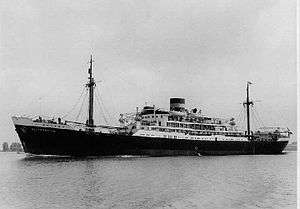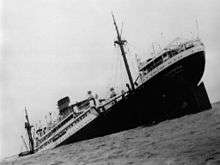Klipfontein
The Klipfontein was a Dutch ocean liner built in 1939.
 | |
| History | |
|---|---|
| Owner: | Holland Africa Line |
| Operator: | Vereenigde Nederlandsche Scheepv Mij. |
| Builder: | Smit P Jr., Rotterdam, Netherlands |
| Yard number: | 517 |
| Launched: | 4 March 1939 |
| Acquired: | 29 July 1939 |
| Fate: | Sunk in 1953 off Ponta Zavora, East Africa after striking a sunken German U-boat. |
| General characteristics | |
| Class and type: | Cargo/passenger liner |
| Tonnage: | 10,544 GRT[1] |
| Length: |
|
| Beam: | 62 ft 9 in (19.1 m)[1] |
| Draft: | 33 ft 1 in (10.1 m)[1] |
| Propulsion: |
|
| Speed: | 21 knots (39 km/h; 24 mph) |
| Capacity: |
|
History
World War II
Klipfontein had been one of the Dutch ships taken over by the War Shipping Administration 23 February 1942, allocated to U.S. Army with the nature of the operating agreement with the Netherlands Ministry of Shipping changed 23 May 1942 to a time charter extending until 1 February 1946.[2][3] The operating agreement was with the Army Transportation Corps with the ship known as the USAT Klipfontein.[2][4] The U.S. Army X Army Corps departed San Francisco Port of Embarkation aboard on 14 July 1944 on the way to Oro Bay, New Guinea and ultimately the Philippines.[4]
Postwar fate
On 8 January 1953, around 11.18 GMT, the Klipfontein struck an object below the waterline near Zavora Point and started sinking. Captain Oosterhuis radioed for help which was received at Beira station and by the nearby Bloemfontein Castle. The ship sank at 14:22 GMT, and six lifeboats were deployed. All 234 passengers were saved and safely aboard the Bloemfontein Castle at 15:45 GMT.
Newspapers from the time stated that with the navigational equipment on board it is not likely that a reef was the 'object'. Through research of the region, it was discovered that there were a couple of sunken ships from the war. According to reports, a German U-boat was torpedoed in shallow waters near the location but was never officially charted.
Her cargo was 1000 tons of copper and manganese ore and 100 bales of wool. The copper was later recovered.
 The Klipfontein sinking
The Klipfontein sinking
References
- Bibliography
- Grover, David (1987). U.S. Army Ships and Watercraft of World War II. Naval Institute Press. ISBN 978-0-87021-766-1. LCCN 87015514.
- Lloyds (1944–45). "Lloyd's Register" (PDF). Lloyd's Register (through PlimsollShipData). Retrieved 30 May 2014.
- Maritime Administration. "Klipfontein". Ship History Database Vessel Status Card. U.S. Department of Transportation, Maritime Administration. Retrieved 30 May 2014.
- Office Of The Chief Of Military History (1959), Order Of Battle Of The United States Army Ground Forces In World War II—Pacific Theater Of Operations, Washington, D.C.: Department Of The Army